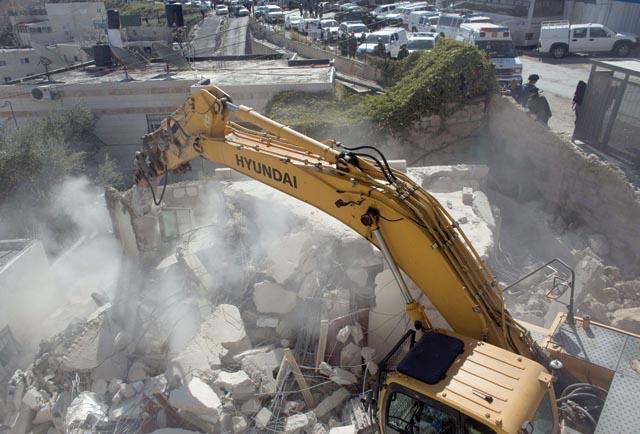OCCUPIED JERUSALEM — Israel pushed forward on Wednesday with plans for more than 550 new housing units in three settlement neighbourhoods of occupied East Jerusalem, the city council said.
In a move likely to escalate tensions between Israel and the Palestinians as they hold US-backed peace talks, the council said it had granted private contractors permits to build 386 units in Jabal Abu Ghneim — known to Israelis as Har Homa — 136 units in Neve Yaakov and 36 units in Pisgat Zeev.
Issuing permits is one of the last stages before construction begins, with building likely to start in the coming weeks, the Israeli Peace Now settlement watchdog said.
“We are talking about building permits, which is really the final stage,” Peace Now spokesperson Lior Amihai told AFP.
“It’s a shameful decision at a shameful time. A government that wants a two-state solution would not issue those amount of permits for East Jerusalem neighbourhoods.”
But the Israeli municipality said the plans “were approved years ago” and noted that, at the same meeting, the local council had also backed plans for construction in Arab neighbourhoods of East Jerusalem.
“There has been no change in the policy of the city council over the past forty years and we are continuing to build in all neighbourhoods of the city according to a plan for Jews and Arabs alike,” the statement said.
Israel occupied East Jerusalem during the 1967 war and later annexed it in a move never recognised by the international community.
It considers all of Jerusalem its “eternal, undivided” capital and does not see construction in the eastern sector as settlement building.
The Israelis and the Palestinians resumed direct negotiations at the end of July with the aim of reaching an agreement within nine months.
But the US-led talks have been overshadowed by Israel’s refusal to rein in construction plans on land the Palestinians want for a future state.
The future status of occupied Arab East Jerusalem, which Israel views as part of its “eternal, undivided” capital and which the Palestinians have demanded as the capital of their future state, is one of the thorniest issues in the decades old conflict.
“Israel is engaging in the deliberate provocation of the Palestinians to drive them to leave the negotiations in protest of Israeli violations, and, therefore, should be blamed for the destruction of the peace process,” senior Palestinian official Hanan Ashrawi said in a statement.
According to figures from Peace Now, in the six months since the talks began on July 29, the government of Prime Minister Benjamin Netanyahu advanced plans for 7,302 new settler housing units, including 4,880 in the West Bank and 2,422 in East Jerusalem.
In the same period, tenders were issued for 4,460 new units — 2,372 in the West Bank and 2,088 in East Jerusalem.
Figures for the whole of 2013 show that 2,433 new East Jerusalem homes were pushed through various stages of the lengthy planning process — indicating that almost all of them were advanced after the talks started.
The Palestinians want East Jerusalem for the capital of their promised state. They, along with the international community, consider settlement construction there as well as in the West Bank a violation of international law.
Ashrawi also condemned the recent demolition of four Palestinian homes in two East Jerusalem neighbourhoods, which left 20 people homeless.
According to figures compiled by the UN humanitarian agency OCHA, in the first six months of talks, Israel demolished at least 350 Palestinian homes and other structures in the West Bank and East Jerusalem, leaving 562 people homeless.
Of that number, 292 structures were in the West Bank and 58 were in East Jerusalem.
















